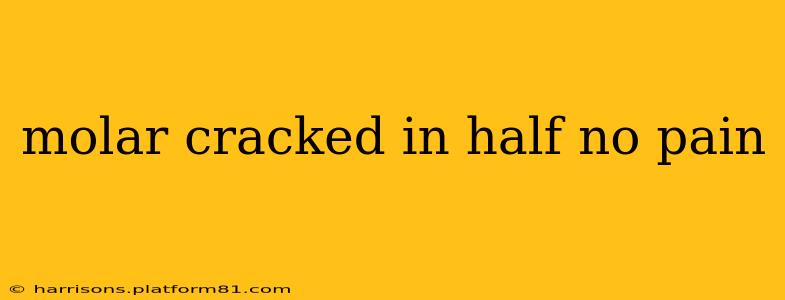Discovering a cracked molar can be alarming, even more so when it's accompanied by a lack of pain. While the absence of pain might seem reassuring, it's crucial to understand that this doesn't necessarily indicate a minor issue. A cracked molar, even without immediate discomfort, requires prompt dental attention to prevent more serious complications down the line. This comprehensive guide will explore the reasons behind painless cracked molars, potential risks, and the necessary steps to take.
Why Doesn't My Cracked Molar Hurt?
This is a common question, and the answer isn't always straightforward. The lack of pain often stems from the type and extent of the crack. A hairline fracture, for example, might not affect the nerve immediately, resulting in no pain. However, this doesn't mean the crack isn't progressing. Over time, bacteria can enter the crack, leading to infection and eventually, significant pain.
Other factors contributing to the absence of pain include:
- Crack Location: If the crack doesn't reach the pulp (the inner part of the tooth containing nerves and blood vessels), you might not experience any pain initially.
- Individual Pain Tolerance: Some individuals have a higher pain tolerance than others.
- Inflammation Stage: The initial stages of a crack may not cause inflammation, thus delaying pain onset.
What Are the Risks of an Unattended Cracked Molar?
Ignoring a cracked molar, even without pain, carries substantial risks:
- Infection: Bacteria can easily penetrate the crack, leading to an infection that spreads to the root of the tooth, the surrounding bone, and even beyond. This can lead to an abscess, a painful and potentially dangerous condition requiring immediate treatment.
- Tooth Loss: The crack can weaken the tooth's structure, making it more susceptible to further fracturing and eventually leading to tooth loss.
- Severe Pain: While you might not feel pain now, the crack will likely worsen, eventually causing intense pain as the infection spreads and the pulp becomes involved.
- Spread of Infection: Severe infections from a cracked tooth can spread to other areas of the mouth or even to the bloodstream, leading to serious health problems.
How Can I Tell if My Molar is Cracked?
Identifying a cracked molar can be challenging, especially without pain. However, some signs to watch out for include:
- Sensitivity to Temperature: While not always present, you might experience some sensitivity to hot or cold temperatures.
- Sharp Pain While Chewing: This pain is often intermittent and may only occur when biting down on the affected tooth.
- Visible Crack: In some cases, you may be able to see a visible crack on the surface of the tooth. However, this isn't always the case.
- Persistent Discomfort: While not sharp pain, you may experience a dull ache or a feeling of something being "off" with the tooth.
What Should I Do if I Suspect a Cracked Molar?
If you suspect you have a cracked molar, even without pain, it's essential to seek professional dental help immediately. Delaying treatment significantly increases the risks. Your dentist will likely perform a thorough examination, potentially including X-rays, to diagnose the extent of the crack and recommend the appropriate treatment.
Treatment options may include:
- Dental Bonding: For minor cracks, dental bonding can be used to repair the affected area.
- Crown: A crown can protect and strengthen a cracked tooth that has some remaining structure.
- Root Canal: If the crack reaches the pulp, a root canal is often necessary to remove the infected pulp and save the tooth.
- Extraction: In severe cases where the tooth is beyond repair, extraction might be the only option.
Can a Cracked Molar Heal on Its Own?
No, a cracked molar will not heal on its own. The tooth's structure doesn't have the ability to repair itself. Without intervention, the crack will likely worsen, leading to further complications.
What Causes a Cracked Molar?
Several factors can contribute to a cracked molar, including:
- Bruxism (teeth grinding): This habit puts significant stress on the teeth.
- Trauma: A blow to the face or jaw can cause a crack.
- Weak Tooth Enamel: Teeth with weaker enamel are more susceptible to cracking.
- Large Fillings: Large fillings can weaken the tooth structure, making it more prone to cracking.
When Should I See a Dentist for a Cracked Tooth?
You should see a dentist immediately if you suspect a cracked tooth, regardless of whether you’re experiencing pain. Early intervention is crucial to prevent more serious problems.
This information is for general knowledge and does not constitute medical advice. Always consult with a qualified dental professional for diagnosis and treatment of any dental condition.
